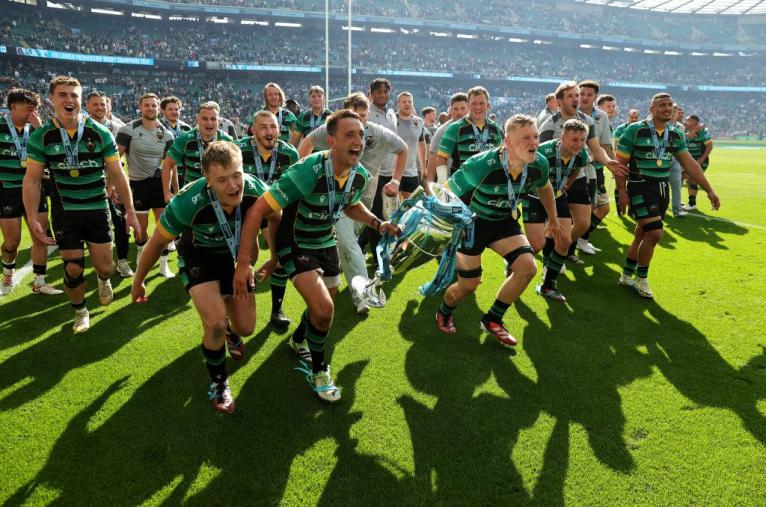September arrives this weekend, the month which traditionally ushers in the start of the rugby season in England. Excitement needs to be tempered this year however as club rugby fans will have to kick their heels until September 20 for the Premiership to kick off.
It feels too late especially when the Top 14 – and the grassroots domestic season from National One downwards – starts a fortnight earlier.
Players need their downtime and with a Premiership final in the middle of June they need to pace themselves. No-one wants to flog the athletes that make the game what it is beyond their limits.

But it is a competitive sporting marketplace out there and while rugby sits back in its hammock and soaks up the last of the summer’s rays, the land grab comes from all angles.
By the time the Premiership eventually gets going, it will be six weeks since the Championship football season started.
It is an invidious comparison in one sense given football’s rapacious march beyond its traditional boundaries – please God rugby never follows suit to that degree – but the point is worth making.
Rugby needs to fight its corner, better serve its fanbase and move to fill the void but the problem it has is there are too few Premiership clubs now to allow that to happen.
September is the overlap battleground between the summer and winter sports and English rugby union, with its current scheduling, is surrendering without a fight.
It isn’t just football. England’s cricket team will play two Tests, the T20s and five one-day internationals in September, the last of which is on the 29th.
Rugby needs to fight its corner, better serve its fanbase and move to fill the void but the problem it has is there are too few Premiership clubs now to allow that to happen.
The contraction to 10 in England may have stabilised finances with a larger slice of the cake for the survivors but the accompanying reduction in the number of matches is constricting.
Ten clubs is too few.
The global consensus points towards bigger being better.

Super Rugby and Japan Rugby League One both operate with 12. Over the Channel, the Top 14 has – as it says on the tin – 14 while URC has 16.
Different factors come into play with leagues which span countries but the basic variety provided by a wider constituency makes a league more interesting.
It is impossible for the English game to magic up an expansion if there aren’t enough viable clubs and last season the Premiership was in effect a nine-plus-one league with Newcastle cast adrift.
But the ambition should be a return to a 12-club operation.
At present there aren’t two Championship clubs strong enough to join the Premiership and allow it to expand back to 12. Certainly, none are capable of doing an Exeter and not only putting down roots but rising right to the top.
When the qualification cut-off point for what is supposed to be elite Champions Cup rugby comes two places up from the bottom, you know the Premiership is light on numbers.
On a broader level English rugby is inching forwards. The performances of the national team, if not the results as yet, have brought optimism. The world title win for England Under-20s in South Africa shows the stocks of the next generation are robust. The RFU’s deal with the Premiership clubs over hybrid contracts threatens joined-up thinking of the kind rarely seen in English rugby since the sport turned professional. The ‘rookie league’ being worked on for U23s players is a positive development too.
The Premiership is competitive – five different clubs have won the title in the past five seasons – and eminently watchable. There was some aesthetically pleasing attacking rugby played last season, led by winners Northampton.
Yet the hole left by the collapse of Wasps, London Irish and Worcester remains a glaring void. The immediate grieving over their collective demise may have passed but the space they have left is a source of continuing weakness.
At present there aren’t two Championship clubs strong enough to join the Premiership and allow it to expand back to 12. Certainly, none are capable of doing an Exeter and not only putting down roots but rising right to the top. The current inequitable funding model, with its bias towards long-standing perpetual shareholders persists, makes that almost impossible.

The three failed clubs believe this helps make the case for them to be reborn in the Championship in 2025-26 but there is plenty of opposition to them being given free passes into the second tier. Sporting justice would suggest they should start again and work their way up from the bottom of the pyramid.
But when it comes to the bigger picture of the health of the English game, if any of them could come up with a convincing business plan the RFU would be duty-bound to listen.
The bottom line is a 10-team Premiership sells the English game, its devotees and its broadcasters short.
A league late to the starting blocks and mothballed entirely during the season’s international windows, punches below its weight.
There may be an advantage to the latter – it gives the season a cleaner feel and is fairer for the clubs which supply England with their players – but not the former. The delayed kick-off needs a rethink and a reboot.
We are where we are this season and supporters of the English club game will just have to remain patient, ticking off the friendlies before the proper stuff starts.
With Owen Farrell starting life at Racing 92, Kyle Sinckler and Lewis Ludlam at Toulon and the Vunipola brothers beginning their new adventures in France too, the English flavour is a strong one.
Maybe they should dip into the Top 14 for a fortnight for their competitive rugby fix where the cast list has never looked so familiar.
With Owen Farrell starting life at Racing 92, Kyle Sinckler and Lewis Ludlam at Toulon and the Vunipola brothers beginning their new adventures in France too, the English flavour is a strong one.
The Rugby Championship continues from the southern hemisphere as another helpful distraction.
The rugby on offer from both sources is superior. That’s irrelevant though if you are a fan. It is the emotional pull of seeing your club run out which really pushes the buttons and for that buzz there is another three long weeks to wait.


I disagree that the competition needs more teams. One of the reasons the quality has been high these past couple of seasons is the consolidation of quality players from worcester, irish and wasps into the other squads giving a greater quality of squad across the Prem (bar newcastle)
Personally I would prefer them to start earlier and finish earlier than start late and finish in the middle of a congested cup finals season where sports fans are again forced to chose what to watch but this time for the showpiece event. This then has the added bonus of players being released to England earlier prior to the summer tours and potentially the six nations
I haven't seen this season's schedule but Borthwick got his players nice and early na6 in June to have a proper tilt at the All Blacks. They didn't win but put up a darn good show. Can only be good for the English game.
I totally agree with you that quality trumps quantity any day. Great to see two English teams in the champions cup semis too, when did that last happen. Also ten teams means that the test players miss fewer league games which improves the integrity of the competition.
Fair to say that both the FFR and URC are making the GP and the RFU look like amateurs at the moment…!